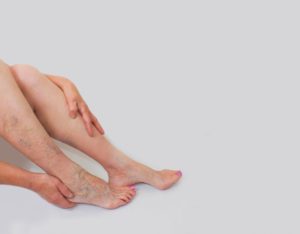
As additional weight accumulates on the legs, the walls of the blood vessels begin to weaken, which causes them to swell and become visible through the skin.
The primary function of veins is to carry blood back to the heart to become re-oxygenated, but if they become weak, they are unable to perform this function, causing blood to pool in the leg. This can lead to swelling, pain, and heaviness sensation in the legs.
There is a more significant risk when blood begins to pool, and that is clotting. Blood clots are particularly dangerous if they dislodge and get stuck elsewhere in the body. For example, a blood clot that travels and stick to the lungs is known as pulmonary embolism and can result in breathing problems.
For some, varicose veins are cosmetic, but if you experience these symptoms, you should seek out medical attention.
- Sore, achy, throbbing legs
- Vein inflammation
- Skin ulcers
- Swollen ankles or feet
Treatment has come a long way for varicose veins. What was once an intrusive procedure is now a simple outpatient procedure with minimal healing time, and you can walk right out of your doctor’s office soon after.
For some patients, they may require combination therapy which your doctor will decide on based on the severity of your varicose veins.
Some ways to prevent varicose veins and reduce the risk of complications is by wearing compression socks to prevent blood pooling, pump your calf muscles, and lastly, not hesitating to visit your doctor.
Varicose veins aren’t just unsightly; they can pose a health risk. Don’t hesitate to get them looked at sooner rather than later.